
The reports on this page consist of collaborations between CAST and our core partner organisations, including the charity Climate Outreach, Tyndall Centre for Climate Change Research, Greater Manchester Combined Authority (GMCA) as well as additional collaborations.
To stay up to date on our latest reports subscribe to our newsletter and follow us on Twitter and LinkedIn.
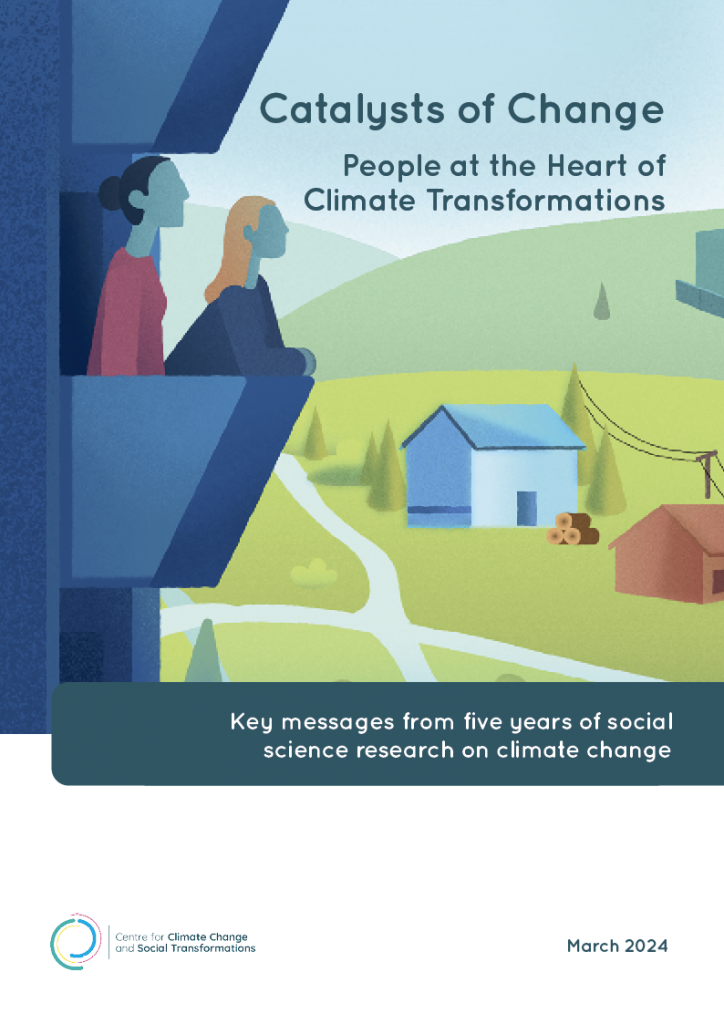
Catalysts of Change: People at the Heart of Climate Transformations
March 2024
Drawing on five years of CAST research conducted in collaboration with policymakers, local authorities, charities, businesses and community groups, this report synthesises five key messages and sheds light on how we can achieve the social changes needed to tackle climate change. The report provides useful insights and recommendations for policymakers and practitioners working towards emissions reductions and net zero targets. It is a vital resource for people involved in policy, business, charity projects, community groups and the media and illuminates the importance of people-centred climate policy and provides actionable steps to better engage the public with climate solutions.
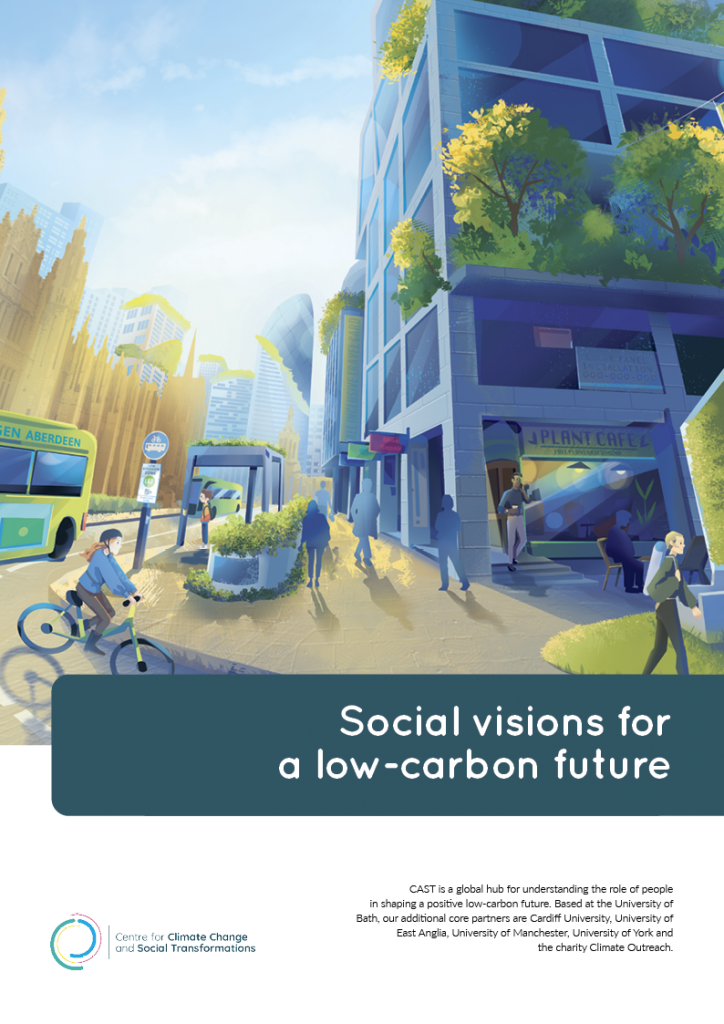
Social visions for a low-carbon future
March 2024
Undertaken as part of the Centre for Climate Change and Social Transformation’s (CAST), as part of its Visioning Theme, this report details our approach to engaging local publics in imagining a low-carbon future. We provide a detailed account of our method, describing the visioning workshops we conducted with participants in the UK, China and Sweden. The main aim of this report is to showcase the co-developed place-based visions created by our participants, presenting illustrated accounts of their place-based visions for a low-carbon future in a way that would not be possible in an academic paper.
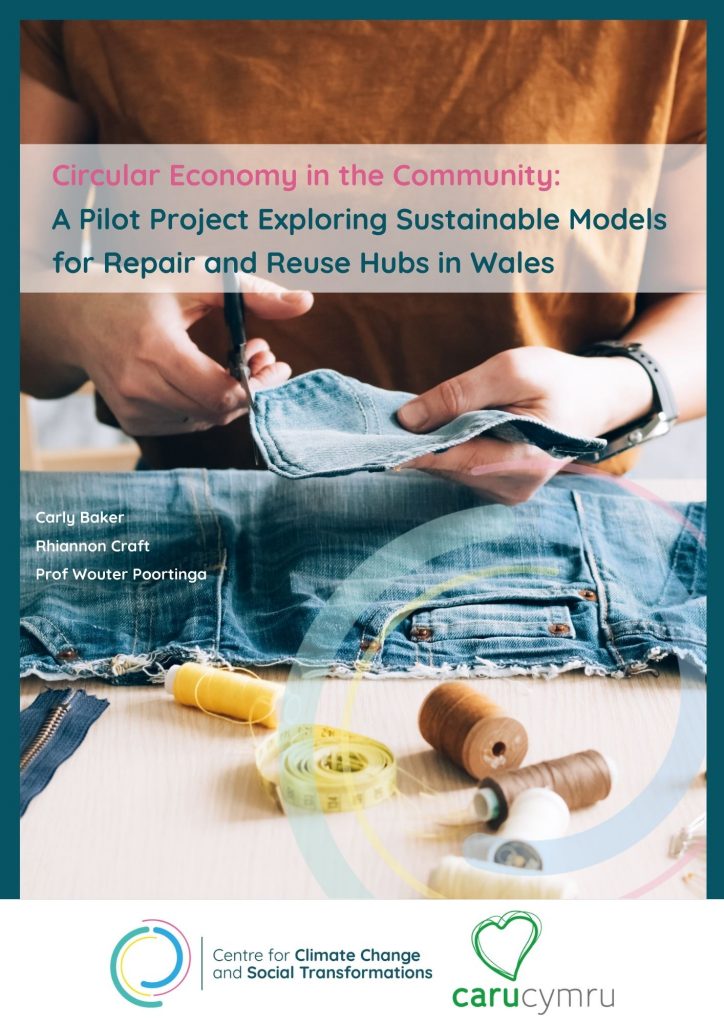
November 2023
This report, written by Carly Baker, Rhiannon Craft and Prof Wouter Poortinga, presents the findings of a pilot project, in collaboration with Keep Wales Tidy, exploring sustainable models for repair and reuse hubs in Wales. It includes a literature review, four case studies, and the results of in-depth interviews with two policy experts and six practitioners involved in the running of existing repair and reuse centres. As well as this, it comprises recommendations for the Welsh Government in their plans to support 80 repair and reuse ‘hubs’ across Wales.
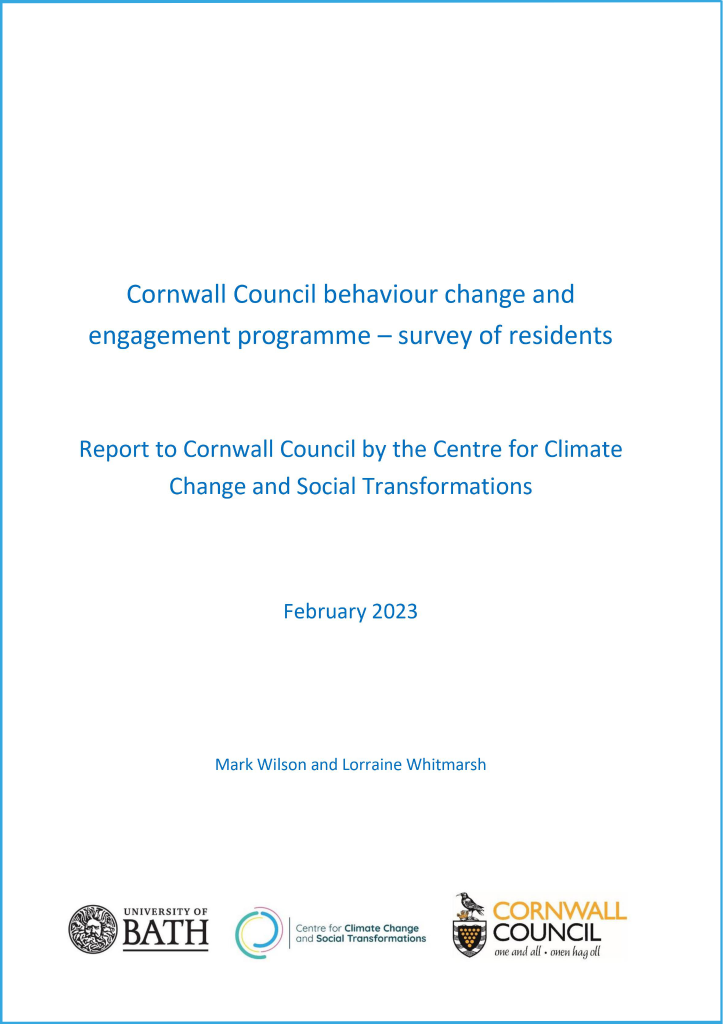
Cornwall Council behaviour change and engagement programme – survey of residents
September 2023
This report, written by Dr Mark Wilson and Professor Lorraine Whitmarsh MBE for Cornwall Council, presents the survey findings which measured Cornwall residents’ perceptions of climate change and their current behaviours in four key lifestyle areas: travel, home energy use, products they buy, and food, and their willingness to alter some of these behaviours in favour of low-carbon alternatives. It also measured to what extent the cost-of-living crisis has already prompted behaviour change. The purpose of this report is to help develop recommendations for encouraging low-carbon behaviours and to provide an evidence base to inform the Council’s climate action.
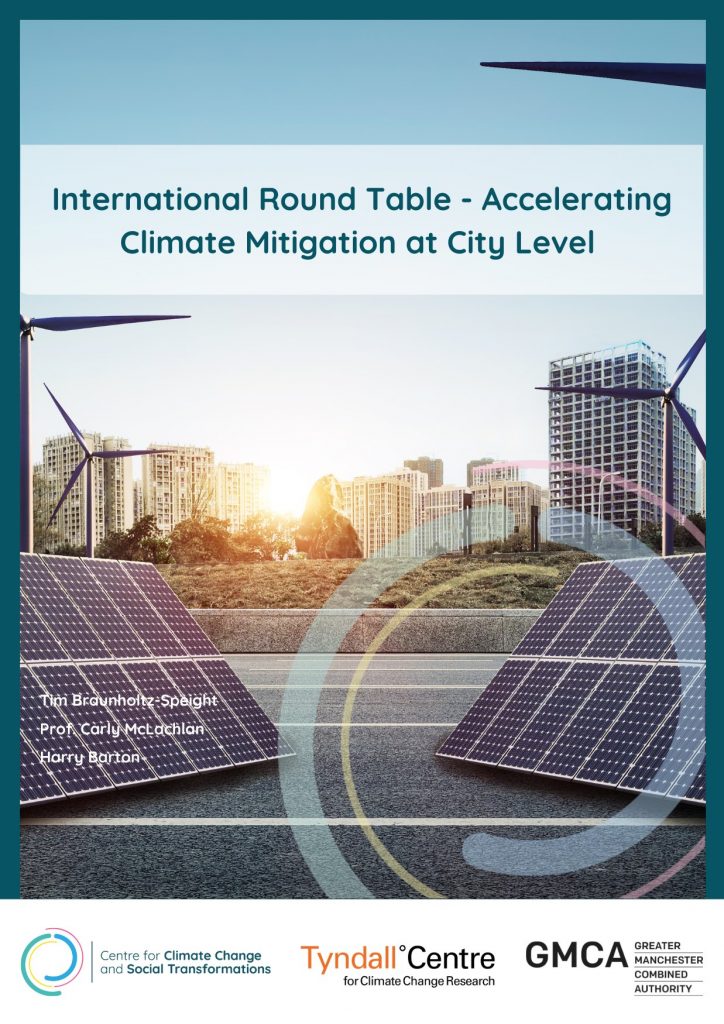
International Round Table – Accelerating Climate Mitigation at City Level
July 2023
This report, written by Dr Tim Braunholtz-Speight, Prof. Carly McLachlan and Harry Barton, provides a summary of key themes and questions that emerged from discussions at the online International Round Table on Accelerating Climate Mitigation at City Level hosted by CAST, The Tyndall Centre for Climate Change Research and the Greater Manchester Combined Authority (GMCA), giving an indication of the pressing issues and current approaches being adopted by those at the forefront of making climate change mitigation happen at city and regional scales.

Organisational transformations for a greener future
February 2023
This report shows how transformative change is being driven through the integration of behavioural and technological innovations and provides a set of principles with applicability across the diverse business community. It provides evidence from 4 case studies of different UK businesses, with each working to achieve their own vision for sustainability.
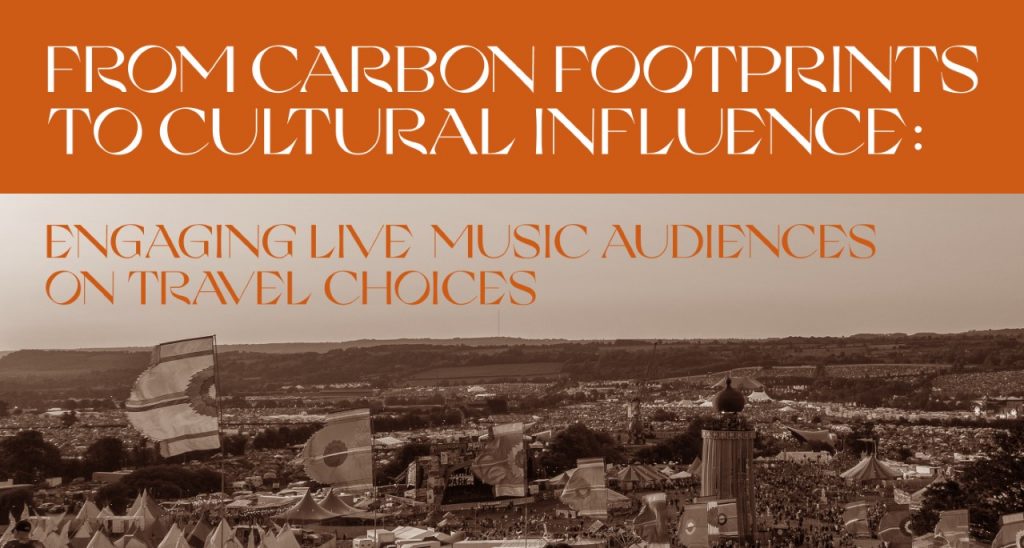
From carbon footprints to cultural influence: engaging live music audiences on travel choices
November 2022
By harnessing the cultural footprint live events have, can faster progress be made on cutting their carbon footprint? This report – supported by the CAST Impact Fund – is based on roundtable discussions with specialists from across the music industry, a survey of festival audience members, and a review of climate communication research.

Developing an evidence-based toolkit for car reduction
October 2022
In collaboration between CAST, Climate Outreach and the Scottish Government we seek to understand and support the development of evidence-based messages to build awareness of and engage with some key audiences around visions of transitions to lower-carbon transport lifestyles in Scotland.

June 2022
Together with Ipsos, we have taken an in-depth look at the public’s attitudes towards climate change and how policymakers can increase support for, and participation in, sustainable policies.
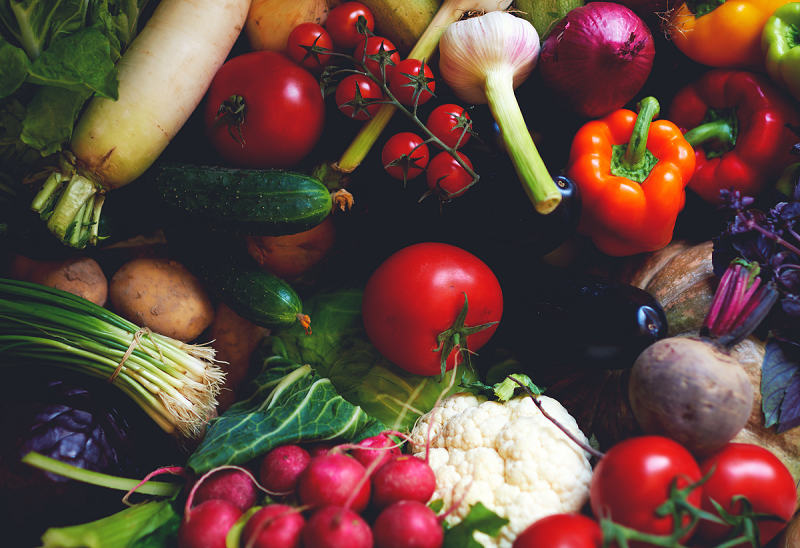
June 2022
The Accessible Veg project was set up to help food-insecure households get fresh vegetables by becoming members of their local community-supported agriculture (CSA) veg bag scheme.

Citizens’ Climate Assemblies: Understanding public deliberation for climate policy
July 2021
This report presents an in-depth analysis of climate deliberation, focussed on the UK’s national Climate Assembly, France’s Convention Citoyenne, and regional UK processes.

The Co-Benefits of Climate Action: Accelerating City-Level Ambition
August 2020
This report from CDP, The Tyndall Centre, and CAST, looks at the additional benefits that climate action delivers, and how cities can utilise these in their decision-making processes.
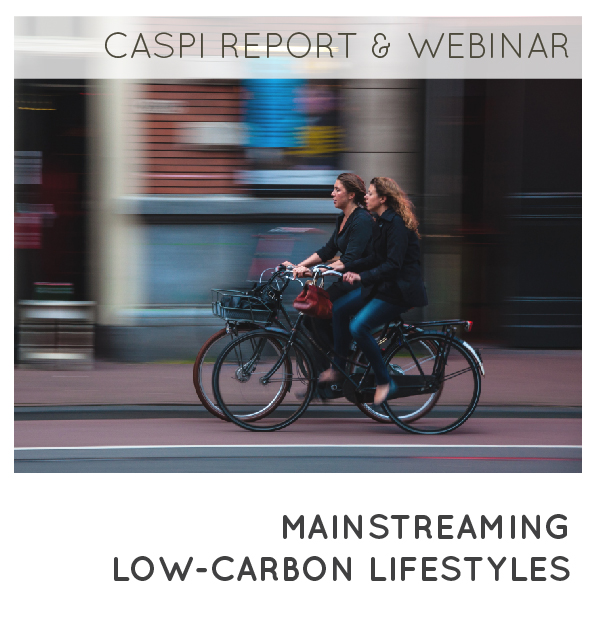
April 2019
The report, commissioned by the Low-carbon Lifestyles & Behavioural Spillover (CASPI) team at Cardiff University, is designed for the wide range of individuals and organisations involved in influencing sustainable behaviours, including national policy-makers, local authorities, professional campaigners, and those leading community-level initiatives.


